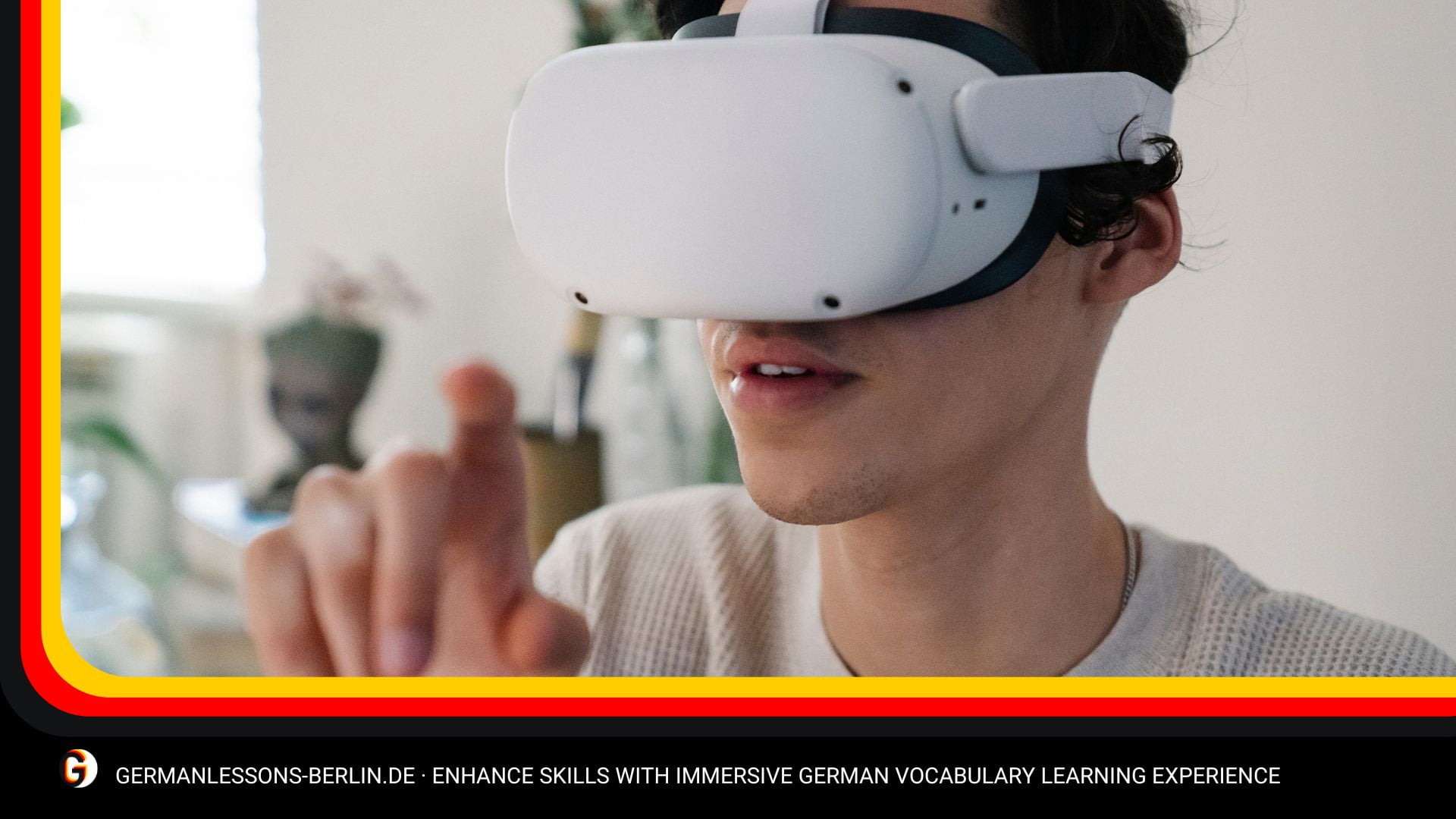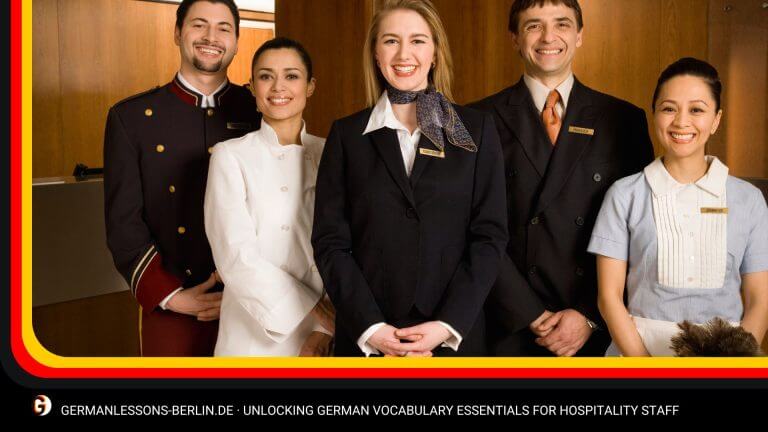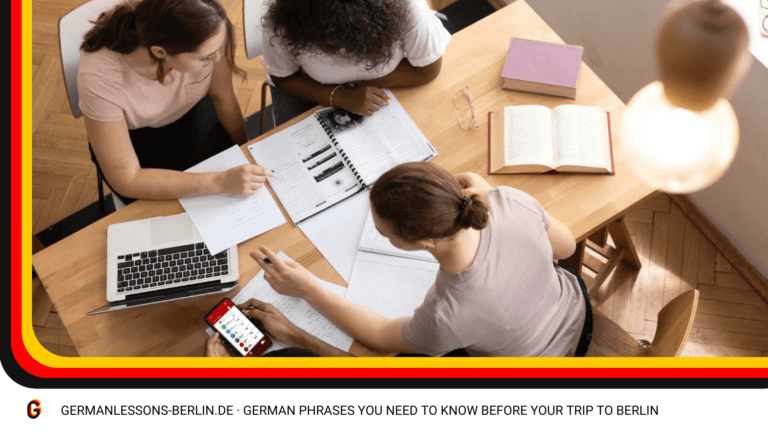Table of Contents
Ever felt the thrill of truly understanding a foreign language? I can tell you, there’s nothing quite like the rush of fluency in German tickling your tongue. When it comes to deepening language proficiency, there’s a widely recognized champion: an immersive German vocabulary learning experience. Ever heard of it? Imagine every corner of your day whispering sweet nothings in German to you – that’s immersion. But here’s the twist: you don’t need a passport for this journey. I’m about to walk you through transforming your home into a German-speaking district, packed full with rich vocabulary and cultural nuances that’ll ramp up your German language fluency.
Right from your cozy couch, we’re turning the everyday mundane into a dynamic language lab. It’s not just about studying; it’s about living German, with every text message ding and every spice jar in your kitchen becoming a lesson in linguistic excellence. So, while the idea of packing bags and living abroad sounds dreamy, let’s be real: it’s not always practical. Instead, let us dive into the nuances of creating a tailor-made German immersion environment that fits into your life seamlessly and enhances your language skills right from your living room.
Key Takeaways
- Create a German-speaking atmosphere at home for an immersive learning journey.
- Engage with the language daily through self-directed learning to enhance fluency.
- Use visual cues and practical interactions to contextualize your vocabulary growth.
- Infuse your environment with German media, learning tools, and conversation for an authentic feel.
- Stay committed to your learning goals to see marked improvement in your German language skills.
The Power of Immersion in Language Learning
When I reflect on my journey in mastering German, it becomes clear that language immersion was the keystone. It’s the natural language learning method that transports you back to the essence of your earliest word discoveries. Living through the lens of a different language might sound daunting, but it’s a stroll down the path our brains were built to trot. With immersion, every facet of our environment becomes a live class in everyday German usage, escalating our command over the language.
My approach involved structuring my day-to-day activities around German. It led to autonomous language learning that felt less like a curriculum and more like a cultural journey. And believe me, such an engagement in German turned my world into a thriving hub of neoteric phrases and idioms that no textbook ever touched.
So, let me peel back the curtain and show you how I infused German learning into the very air I breathe, making self-directed learning not just a goal but a reality.
Why Immersion Feels Like a Natural Process
The beauty of natural language learning is its seamless integration into our lives. As children, we sponge language through interaction, trial, and error. We don’t learn; we simply exist and the language takes root. By recreating this environment later in life, we can capture that effortless acquisition style, even when tackling the complexities of German vocabulary.
- Constant exposure to German at home, work, or during leisure time.
- Real-life usage goes far beyond textbook, reaching the essence of everyday German usage.
- Experiencing an array of situations in the target language fosters deeper knowledge.
Autonomous Learning Through Everyday Engagement
Design your life’s backdrop to echo the streets of Berlin or the charm of Munich cafes. Your kitchen, your smartphone, the music you listen to—let them all serenade you in German. This approach fast-tracks the learning process, turning every day into a chance for exploration and growth. It prompts you to take ownership, autonomous language learning at its finest, and believe me, it sticks.
Engage first, study second; that’s the cornerstone of progressive language condensation.
Speaking with Confidence: Overcoming the Language Barrier
I remember the trepidation before my first real conversation in German. But as I pushed through, those barriers crumbled. Speaking German confidently is like flexing a muscle—the more you engage in communication in German, the stronger that muscle gets. Mistakes became invaluable, practical lessons rather than embarrassments, and I’ve watched my fluency skyrocket.
| Traditional Learning | Immersive Learning |
|---|---|
| Textbook scenarios | Unpredictable daily interactions |
| Memorization of vocabulary | Contextual learning of phrases |
| Classroom setting | Whole-world exposure |
| Rote grammar drills | Conversational practice |
| Static language input | Dynamic language evolution |
Take it from my experience: Transformation occurs when you lean into the culture, challenging the language barrier head-on. It’s the dialogue with your favorite German series character, the shopkeeper banter, and the recipe you cook—that’s your classroom. The result? Capable, poised communication in German, woven seamlessly into the fabric of your life.
Transform Your Environment Into a German Haven
Who says you need a passport to immerse yourself in the German language? I believe in bringing the world to my doorstep, and today I want to share how I’ve transformed my little nook into a German-speaking sanctuary. By creating a German learning environment and gearing up for German immersion at home, I’ve simulated the vibrant, language-rich setting of a bustling German town, right here in my own living space.
My first step towards this transformation was simple yet effective: switching the language settings on all my devices to German. Believe me, even the mundane act of checking the weather starts to reinforce language patterns when you’re deciphering German terms for ‘partly cloudy’ or ‘chance of showers’.
- Saturated daily life in a German language-rich setting
- Re-framed my electronic interactions to learn intuitively
- Turned every notification into an unmissable flashcard
Next, sticky notes became my go-to allies. My home is now dotted with these small but mighty aides, each proudly bearing a German noun complete with its article – ‘der, die, das’. The fridge? That’s ‘der Kühlschrank’. The mirror? ‘Der Spiegel’. My comfy red armchair? ‘Der Sessel’.
Walking through my home is like strolling through a dynamic dictionary—one brimming with colors and everyday relevance.
But I didn’t stop there. I found that regular interaction with German media like films, music, and news broadcasts to be staggeringly effective. Suddenly, the voices narrating my evenings were talking about Berlin’s street art or a new gallery opening in Dresden. My mornings were enlivened by German radio shows, offering glimpses into current events and culture.
| Device Setting | Learning Outcome |
|---|---|
| Smartphone in German | Learn on-the-go; never miss a lesson |
| German Music Playlist | Understand rhythmic speech patterns, cultural tunes |
| TV Shows auf Deutsch | Captivate yourself with stories while learning conversational cadence |
| German News | Expand topical vocabulary and current affair discussions |
These tactical alterations to my environment yielded a natural, sustainable approach to language acquisition. And you know what? My home didn’t just become a German haven; it became a treasure trove of discovery and a constant invitation to converse with the culture itself. A real, tactile, immersive German experience that nurtures my linguistic abilities every single day.
German Vocabulary Essentials for Hospitality Staff
Working within the vibrant world of hospitality, I’ve come to realize that mastering German vocabulary for hotel employees is more than just a linguistic requirement—it’s the gateway to enriching guest experiences and ensuring operational excellence. Whether it’s the welcoming “Guten Tag!” or a helpful “Wie kann ich Ihnen helfen?”, every interaction is an opportunity to showcase professionalism and warmth. So, let me share some essential German phrases for hotel staff that have become my daily companions in the hotel scenery.
Key Phrases for Everyday Hotel Operations
No day at work is the same, but certain phrases in the German language for the hotel industry are universal currencies, paying dividends in the form of guest satisfaction. Here are those nuggets of German phrasing gold.
- Begrüßung (Greeting): “Herzlich willkommen im Hotel Eden!” (Welcome to Hotel Eden!)
- Wegeleitungen (Directions): “Der Aufzug befindet sich zu Ihrer Rechten.” (The elevator is on your right.)
- Zimmeranfragen (Room Requests): “Möchten Sie ein Zimmer mit Aussicht?” (Would you like a room with a view?)
- Speisen und Getränke (Food and Beverage): “Das heutige Abendessen wird um 18 Uhr serviert.” (Dinner is served at 6 PM today.)
- Notfallsituationen (Emergencies): “Bitte bleiben Sie ruhig, wir haben einen Notfallplan.” (Please remain calm; we have an emergency plan.)
These phrases form the core of impactful German hospitality language that I employ to navigate the busy tides of hotel operations with ease and confidence.
German Hospitality Terms That Make a Difference
Knowing the right hospitality vocabulary in German can truly make or break a guest’s experience. It’s not just about the words—it’s the finesse and cultural touch they bring to each interaction.
| English Term | German Term | Application in Hospitality |
|---|---|---|
| Reservation | Die Reservierung | Confirming a guest’s booking details. |
| Check-in | Der Check-in | Welcoming guests upon arrival. |
| Amenities | Die Annehmlichkeiten | Explaining hotel features and services. |
| Housekeeping | Der Zimmerservice | Informing about room cleaning services. |
| Billing | Die Abrechnung | Delineating charges upon check-out. |
My go-to resource? A trusty list of German for hotel jobs terms that keeps my communication crisp, kind, and above all, authentically German. It’s these dedicated hospitality terms that infuse life into the hotel’s ambience, painting a picture of a locale that cares for its guests and their experience.
Deepening my understanding of the German language for the hotel industry extends far beyond functional language use—it’s about creating connections and leaving impressions that last well beyond checkout.
Whether it’s the seamless check-in dialogue or the adept handling of a special request, my command of hospitality-centric German vocabulary for hotel employees enriches every interaction, proving that often, language is the finest hospitality we can offer.
Incorporating German Culture for Enhanced Vocabulary Retention
While unpacking the intricacies of the German language, I discovered an invaluable strategy for solidifying my vocabulary: embedding myself in German culture. Delving into the heart of traditions and customs, I’ve experienced firsthand how festive joviality or poignant historical reminders offer deeper retention of words and expressions, lifting the words from mere text to lived experiences that resonate on a personal level.
Take for instance, the spirited cheer of Oktoberfest. It’s one thing to read about it, but it’s another to clasp a hefty Stein in my hands, clad in my very own Tracht, and join in the merrymaking—an experience embedding words like Gemütlichkeit (coziness) and Prost (cheers) into my memory like vibrant snapshots.
Delving into Traditions to Understand Contextual Usage
My quest to soak in German traditions has led me far beyond the clatter of beer mugs. From the contemplative quiet of Volkstrauertag, a day of remembrance, to the lively masquerade of Karneval, every tradition pulses with its own set of vocabularies reflective of German culture and language. It’s through these culturally rich celebrations I not only learned what the words mean but how they fit beautifully into their contextual niches, enriching my understanding of German’s complex tapestry.
By witnessing the rituals of a Weihnachtsmarkt (Christmas Market), the aroma of Glühwein (mulled wine) und Lebkuchen (gingerbread) in the air, I gained not just words, but a treasure trove of contextual German vocabulary usage.
- Exploring holiday customs like Ostern (Easter) and incorporating terms such as Osterhase (Easter bunny) into my lexicon.
- Savoring culinary traditions, which taught me the delight and vocabulary of dishes like Sauerkraut and Schnitzel.
- Reading German folklore, understanding historical contexts, and how they have shaped the modern usage of the language.
The importance of these cultural nuances became startlingly clear through my interaction with different aspects of German society. I found the retention of language to be far more tenacious when words were tied to tangible experiences or traditions. It’s an engaging journey of educational and cultural fulfillment, a cyclical process where language and culture perpetually enrich each other.
| Tradition | Key Vocabulary | Cultural Significance |
|---|---|---|
| Oktoberfest | Dirndl, Lederhosen, Bierzelt | A world-renowned festival celebrating Bavarian culture, food, music, and, notably, beer. |
| Karneval/Fasching | Jeck, Umzug, Prinz Karneval | A festive season with parades and masquerading, spotlighting humor and satire. |
| Erntedankfest | Ernte, Dankbarkeit, Feldfrüchte | A harvest festival expressing gratitude for the year’s bounty, with traditional foods and customs. |
| Weihnachten | Tannenbaum, Bescherung, Heiligabend | The warmth of German Christmas traditions, evoking the spirit of familial gathering and gift-giving. |
My adventure in German culture and language has been a profound testament to the power of traditions and language retention. As I march forward, I continue to marry these two elements, creating a linguistic experience that’s rich in flavor and rooted in the very essence of Deutschland.
Interactive Techniques to Master German Vocabulary
When I embarked on the challenge of mastering the German language, I found myself searching for methods that would allow me to retain new vocabulary not just for the day, but for life. It was during this quest for effective vocabulary techniques that I discovered the magnetic allure of interactive German vocabulary learning—a realm where language education becomes not just a task, but an engaging activity teeming with life and enjoyment.
In this section, we’ll delve into the dynamic world of interactive learning, where traditional memorization paves way for exciting, interactive techniques that solidify our German vocab mastery. Here’s how I gave the tiresome repetition a much-needed upgrade using a blend of conversations, games, and simulated scenarios that make learning irresistibly fun.
Let’s face it, we learn best when we’re having fun and we’re actively engaged. It’s through interaction that words transform from text to tools.
- Initiating casual conversations in German to use new vocabulary in real-time settings.
- Introducing language games that naturally build retention while providing entertaining challenges.
- Incorporating role-playing scenarios to simulate authentic conversations and situations.
For me, role-playing was a game-changer. It pushed me to employ the words and phrases I had learned in meaningful exchanges, much like an actor stepping into character. This active usage is the golden key to permanently etching words into memory. Below is a simple exercise I frequently use:
| Learner’s Role | Choosing Situations | Gained Vocabulary |
|---|---|---|
| Hotel Guest | Simulating check-in at a virtual German hotel | Phrases for greetings, requests, and thanks |
| Waiter/Waitress | Ordering at a German restaurant | Food related words, polite expressions |
| Shopping Enthusiast | Buying clothes in a German shop | Color, size, and apparel vocabulary |
Delving into these roles thoroughly ingrains the relevant vocabulary while bringing a rush of excitement to the learning process. It’s through these scenarios that I’ve gained not just a list of words, but a wealth of phrases ready for use in real-life conversations.
So, you see, interactive German vocabulary learning is about creating an active dialogue between yourself and the language. It’s a journey where each playful interaction or role-played conversation brings you closer to mastering German. With these methods, your vocabulary blossoms, fostering an authentic connection with the language that traditional methods may not offer.
- Engage in German conversation clubs or meetups.
- Create a German word-of-the-day calendar.
- Use flashcards with not only words but also images and sentences.
- Write short, interactive German stories using new vocabulary.
Who knew that mastering German could be so enthralling? By weaving these interactive elements into my daily practice, I’ve carved a path to proficiency that is colorful, vibrant, and effective—a path that turns the arduous into the adventurous.
Maximizing Digital Tools for German Vocabulary Acquisition
As I continue to share insights about my journey in mastering German, an integral part to highlight is the role that digital tools have played. They’ve offered a bridge to an extensive repository of words, idiomatic expressions, and sentence structures. The transformation in my German vocabulary is largely attributed to these innovative and interactive technologies designed for linguistic excellence.
Learning a language in the digital era has its advantages. I’ve experienced firsthand how applications and multimedia content have made German more accessible and interactive, leading to improved comprehension and retention. Below are some essential German language learning apps and resources that have aided my journey.
Apps and Resources for Effective Learning
One of my greatest allies in vocabulary building has been the range of German language learning apps available at the touch of a button. With features tailored to individual learning styles, these applications have been beneficial in a myriad of ways.
- Interactive exercises that adapt to my progress
- Digital flashcards visually reinforced with images and examples
- Personalized learning paths that match my proficiency level
It’s incredible how apps can provide real-time feedback, ensuring that I’m not just memorizing words but actually understanding them in context. They have allowed for a dynamic approach to learning that’s both flexible and structured.
The Role of Multimedia Content in Vocabulary Building
The explosion of multimedia German language content has transformed the landscape of language learning. Videos, music, and podcasts are not just passive entertainment; they are rich mines of vocabulary and cultural nuances waiting to be explored.
| Multimedia Content | Benefits for Vocabulary Acquisition |
|---|---|
| German Films and TV Shows | Enhances listening understanding and exposes me to various dialects and colloquialisms |
| German Podcasts | Improves my auditory skills and comprehension of complex topics |
| German Music | Teaches me rhythm, intonation, and the emotional conveyance of phrases |
By engaging with different types of German multimedia content, I’ve not only expanded my vocabulary but also developed a deeper appreciation of the cadences and melodic quality unique to the German sound.
These tools have exponentially improved my German listening and reading skills. For instance, I started to recognize the subtleties of the language’s rhythm and intonation through listening to a variety of German musical genres. Moreover, watching films in German allowed me to see words come to life in the mouths of native speakers, which was essential for my pronunciation and comprehension.
Leveraging such digital vocabulary tools and resources for learning German has turned a once daunting expedition into a pleasurable and highly fruitful endeavor. As I continue to discover new content, my fascination with this rich and complex language only grows stronger, pushing me towards fluency with each day.
German for Hotel Jobs: Tailoring Your Learning for The Industry
As I ventured through the intricacies of German, I discovered the undeniable value of tailored German learning for hotel industry professionals. It’s one thing to study German in a generic sense; it’s another to immerse yourself in industry-specific German language skills that can utterly transform guest experiences and streamline daily operations. That’s the beauty of customizing your learning journey—it becomes a well-fitted key unlocking the potential of eloquent and effective hospitality communication.
Understanding the role that language plays in hospitality isn’t just about memorizing phrases; it’s about weaving them into the service you provide. Knowing how to efficiently express ‘availability’ (Verfügbarkeit) or ‘reservation’ (Reservierung) is just the beginning. Therefore, my focus has always been on amassing a repertoire of terms and dialogue scenarios that resonate specifically with hotel guests and staff. This approach doesn’t just enhance guest interactions—it elevates the entire atmosphere of the hotel.
By refining my German language capabilities, I’ve not only eased communication barriers but also fortified my industry expertise, making me a vital asset to the cosmopolitan environment of hotels.
In this pursuit, I crafted a table of key German terms paired with their English counterparts and examples of their application in hospitality. This table didn’t just serve as a reference—it became an active pillar of my everyday hotel interactions, lending confidence and clarity to my communication with guests and colleagues alike.
| English Term | German Term | Practical Use in Hospitality |
|---|---|---|
| Check-In | Der Check-In | Greeting guests and starting the hotel stay experience |
| Booking | Die Buchung | Assisting guests with room reservations |
| Concierge | Der Concierge | Providing guests with information and special requests |
| Room service | Der Zimmerservice | Handling orders for in-room dining |
| Invoice | Die Rechnung | Explaining charges upon check-out |
Aligning my vocabulary with the fast-paced environment of hospitality meant engaging in role-plays typical of hotel scenarios. I thoroughly rehearsed making reservations, giving directions, handling special requests, and explaining hotel policies—all in German. This hands-on, industry-specific practice was instrumental in not just memorizing terms, but in grasping their context and usage empathetically.
- Role-playing to simulate real-world interaction
- Studying dialogues that reflect authentic guest communications
- Focusing on cultural nuances specific to the hospitality industry
The culmination of these efforts has not only geared my German learning journey toward the hotel industry but has offered a distinct edge in varied hospitality situations. Now, fluency in German helps me navigate the hotel milieu with aplomb, proving that language is indeed the ultimate hospitality.
German Language Skills for Hotel Staff: Beyond the Basics
As I carved my path through the hotel industry, it dawned on me that a firm grasp of advanced German language skills is more than just an impressive line on a resume. It’s a key ingredient to exceptional guest service. My pursuit of comprehensive German vocabulary and cultural proficiency has not just been about communication—it’s been an enriching journey that honed my hotel staff language proficiency beyond the basics.
Understanding the nuances that cirulates within tones, the appropriateness of formality, and the delicate intricacies of cultural references was akin to unlocking a new dimension in hospitality. It cultivated a deeper connection with guests, peppered with personalized interactions and rooted in genuine understanding.
Only when I transcended the rudiments and embraced the subtle complexities of the German language did I truly elevate the guest experience to a work of art.
Let me illustrate. Say a guest inquires about local dining spots. Responding with a basic “Guten Abend, das Restaurant X ist gut,” is polite but expected. Now, imagine weaving in local jargon or a popular colloquialism with confidence, perhaps mentioning the chef’s regional specialties or giving insights on local etiquette—a conversation that reflects a nuanced mastery surely impresses.
Here’s a look at the key areas where advanced German skills have empowered me:
- Cultural Fluency: Not just knowing the language, but understanding the cultural backdrop that paints every conversation.
- Tone & Formality: Discerning when to be cordial and when casual banter is appreciated by guests.
- Subtext Reading: Listening not only to what is said but also to what is meant, a skill crucial in preempting guests’ needs.
Beyond the spoken word, investing in a rich vocabulary has propelled my career in ways I had not imagined. From clear, concise internal communications with my team to making a stellar impression during management meetings, the benefits have been manifold.
| Aspect of Language | Relevance in Hospitality | Impact on Guest Experience |
|---|---|---|
| Vocabulary Depth | Accommodating diverse guest needs with precision | Guests feel listened to and understood |
| Cultural Intelligence | Customized service catering to international clientele | Guests appreciate the personalized attention and sensitivity |
| Conversational Agility | Smoothly navigating various hospitality scenarios | Fosters a more relaxed and inviting atmosphere |
| Language Adaptability | Adjusting language formality and tone as per situation | Enhances professionalism and builds trust |
| Empathetic Communication | Understanding underlying guest emotions and intentions | Creates a deeper sense of connection and care |
My narrative intermingles with those of countless colleagues who have realized that a leap from basic to advanced German language aptitude crafts a realm of possibilities within the hospitality sector. It is in this vibrant mosaic of interactions that I find the true essence of my profession. The harmonious blend of German language competence and cultural insight not only boosts my day-to-day efficacy but also emboldens my professional growth within this ever-evolving industry.
Real-Life Applications of German Vocabulary in Hospitality
If you’ve ever been to a bustling hotel lobby or a thriving restaurant, you know that the air buzzes not just with activity, but with communication—pivotal communication that powers these hubs of hospitality. As I honed my German speaking skills, it became increasingly clear that the need for practical German vocabulary use was critical, particularly within the context of hospitality industry communication. It’s astonishing how the learned terms from books spring to life in the midst of real-world interactions in the hospitality sector.
When applied effectively, real-life language application in the hospitality business not just helps bridge the gap between staff and guests, but it paves the way for nuanced, culturally enriched guest experiences. To me, there exists a discernible difference between reciting memorized phrases and engaging with guests using vocabularies seasoned with empathy and understanding—a difference that embodies the soul of true hospitality.
Making that leap from the theoretical to the practical involved a series of interactive techniques, which not only solidified my German vocabulary but accustomed me to the quick-thinking required in the hospitality setting. One of the most effective methods was role-playing. Let’s peek into how it fostered my confidence in language application:
| Role-Played Scenario | German Vocabulary Focus | Outcome |
|---|---|---|
| Check-in at a hotel | Greetings, room types, amenities | Smooth start to guest experience |
| Dining service interaction | Menu items, food preferences, payment options | Personalized meal engagement |
| Handling guests’ inquiries at reception | Local attractions, directions, transportation | Elevated concierge service |
Another immersive technique I found invaluable was examining hospitality industry case studies. This method allowed me to analyze real-life scenarios, mulling over conversations and envisioning how I would use my German vocabulary to navigate various guest relations situations.
I remember an incident narrated in one case study: a guest was upset due to a misunderstanding with his room booking. The hotel staff, adept in German, used compassionate language and a calm demeanor to resolve the situation, turning a potential negative review into a testimonial of excellent service. That’s the power of language at work.
Additionally, simulating operational scenarios through team exercises has proven to be effective in preparing for the high-paced and unexpected demands of the hospitality industry. Our exercises ranged from emergency protocols to guest check-outs, each time with an arsenal of relevant vocabulary that made us not just effective communicators but empathetic caretakers of our guests’ experience.
- Simulation of emergency evacuation instructions
- Practicing end-to-end procedures for VIP guest arrivals
- Role-playing scenarios of conflict resolution with guests and between staff
This practical application of German in real-life hospitality encounters did more for my proficiency than any advanced class could. It ingrained in me not only the importance of the words but also the rhythm and pace of natural speech, essential cues that can only be learned in the throes of actual conversation. In conclusion, embracing real-life language application has pushed me past the threshold of simply knowing a language to actively speaking it with the finesse and intuition necessary for the hospitality world.
Tracking Your Progress: Measuring Vocabulary Milestones
Embarking on the journey of learning German, I discovered early on that measuring my progress wasn’t about vanity—it was about validation. You see, without tracking my German vocabulary milestones, I would be adrift in a sea of words, never really knowing how far I’ve come or in which direction I’m headed. It led me to establish a personalized system for language proficiency assessment and vocabulary progress tracking.
My system wasn’t just about rote memorization or listing new words. I dove headfirst into bringing order to the chaos, encouraging my brain to recognize patterns and achievements. Below, I’ve outlined the means that have kept my German language progress in a crystal-clear perspective.
Self-Assessments: A Personal Reflection
There’s a certain kind of honesty required when assessing one’s own skills. That’s why I crafted a German vocabulary rubric for myself—a checklist if you will—that covered an array of situations and topics. I needed to know that I was as comfortable ordering a schnitzel at a restaurant as I was discussing Nietzsche’s philosophy, albeit at my current level of understanding.
It’s an eye-opening experience to gauge your own progress. It makes you accountable and offers a dose of reality to your learning goals.
Technology-Assisted Progress Charts
Digital tools have proved invaluable. I’ve used language learning apps that feature progress charts reflecting the new German words I’ve learned, their frequency in my practice, and my success rate in employing them correctly. It’s like having a personal academic coach nestled in my smartphone.
| Week | New Vocabulary Learned | Usage Accuracy | Retention Rate |
|---|---|---|---|
| 1 | 50 | 70% | 60% |
| 2 | 75 | 80% | 65% |
| 3 | 90 | 85% | 70% |
Observing this data regularly, I could literally see my vocabulary base expanding and solidifying. It allowed me to adjust my study habits effectively.
Standardized Tests: Objective Benchmarks
Eventually, I turned to standardized tests such as the TestDaF and Goethe-Zertifikat. These weren’t just tests; they were milestones—each one a robust language proficiency assessment tool that quantified my reading, writing, listening, and speaking abilities in German.
- TestDaF offered me a glimpse into my readiness for university studies in Germany
- Goethe-Zertifikat validated my skill level with a globally recognized certificate
These structured assessments challenged me to study purposefully and offered a universally understood metric of my abilities—a must-have for any serious German learner.
The blend of self-assessment, technological assistance, and formal benchmarks became my lighthouse in the often foggy journey of language acquisition. As I advocate for this triad approach to other aspirants, I’ve seen their proficiency flourish. It’s transparent, it’s effective, and most importantly, it tells me unerringly that I am, indeed, making strides toward fluency in German—mein Weg zur Meisterschaft.
Conclusion: Embracing the Journey Towards German Language Proficiency
My quest for German language mastery has been no less than a passionate sojourn through cultures, interactive challenges, and cognitive milestones. As I reflect on this journey, I see a canvas painted with the vibrant hues of practice, repetition, and real-world application. The essence of my expedition—a finely woven tapestry of immersive German vocabulary learning experiences—has forever changed the way I perceive and interact with language. No corner of my daily existence has been left untouched by the rich German lexicon I’ve so eagerly embraced.
From the comfort of my home, I’ve ventured through the very heart of German, infusing my surroundings with a succulent mixture of sights, sounds, and cultural landmarks that speak to an authentic German encounter. By mingling visual aids, technology, and culinary adventures with my study routine, I’ve unlocked a dynamic method to bolster vocabulary retention and use. It’s through this reflective immersion experience that I cultivated not just knowledge, but a heartfelt bond with German, enabling me to communicate with the assurance of a seasoned speaker.
In conclusion, the summary of my German vocabulary learning is a testament to the power of a well-rounded, pragmatic approach. Fusing the everyday with the academic, the cultural with the conversational, I’ve arrived at a juncture where I confidently stand with a robust command of the German language. This conclusion isn’t an end, but a gateway to continued exploration and refinement of skill. My reflective journey shows that with dedication, an immersive language experience can indeed lead to German language mastery—one beautifully crafted sentence at a time.
FAQ
Why is an Immersive German Vocabulary Learning Experience important?
An immersive learning experience is critical for enhancing language skills because it replicates the natural process of language acquisition, promotes fluency, and helps you to use the German language confidently in a variety of contexts. By immersing yourself in the language, you become more familiar with its nuances and learn to communicate more effectively.
What are the advantages of language immersion over traditional learning methods?
Language immersion offers the advantage of natural language learning, where you are constantly engaged with German in everyday situations, fostering a deeper understanding and faster learning. Autonomous learning promotes self-directed approaches, helping you to learn German in a way that feels most natural to you.
How can I create a German learning environment at home?
You can transform your space into a German haven by incorporating various immersive strategies. Change the language settings on your electronic devices to German, label items around your home with Post-it notes in German, and regularly consume German media, like movies and podcasts, to enhance your learning experience.
What are some essential German phrases for hotel staff?
Essential phrases include basic greetings, directions to commonly needed areas like the bathroom or the dining room, and common requests from guests. Knowing these phrases helps ensure smooth interactions with guests and contributes to a positive hospitality experience.
Why is it beneficial for hospitality staff to learn German hospitality terms?
Learning specific terms related to the hospitality industry can significantly improve the service you provide. It allows for clear communication and helps you to meet the needs of guests more efficiently, enhancing the overall guest experience.
How does understanding German culture enhance vocabulary retention?
Engaging with German traditions and cultural nuances provides context for the vocabulary, making it more memorable. Learning holiday customs, culinary terms, and even local dialects can help cement your vocabulary because you understand when and how to use these words properly.
What are some interactive techniques to master German vocabulary?
Techniques such as role-playing, language games, conversation practice, and using flashcards are highly effective for mastering vocabulary. They encourage active use of the language and help with long-term retention.
What digital tools are recommended for German vocabulary acquisition?
There are many apps and online resources that offer personalized learning paths, interactive exercises, and flashcards. These tools can greatly aid your vocabulary acquisition, tailored to your proficiency level and learning style.
How does multimedia content contribute to building German vocabulary?
Multimedia content exposes you to the language as it is used by native speakers. It enhances listening skills, helps you to learn the correct pronunciation and intonation, and provides context for how words and phrases are used in different situations.
How can I tailor my German learning for the hospitality industry?
Focus on learning vocabulary, dialogues, and scenarios that pertain to hospitality. Understanding the specific language used in hotel operations will improve your ability to communicate effectively in your hotel job and provide quality service to guests.
Why is it important for hotel staff to go beyond basic German language skills?
Advancing beyond the basics and gaining proficiency in more complex language skills can enhance guest experiences. Being able to understand and express finer nuances of the language can lead to better interactions and may also open up further career opportunities within the hospitality industry.
In what ways can I apply German vocabulary in real-life hospitality situations?
To apply German vocabulary in real-life hospitality contexts, you can engage in simulations and role-play scenarios that mimic guest interactions. Additionally, studying case studies can provide insight into how language can be used in various operational scenarios.
How can I track my progress in learning German vocabulary?
You can track your vocabulary learning progress through self-assessments, maintaining a progress journal, and taking standardized tests designed to measure language proficiency, such as the TestDaF or Goethe-Zertifikat. These methods will help you identify areas of improvement and ensure that you are on the right track to achieving fluency.








